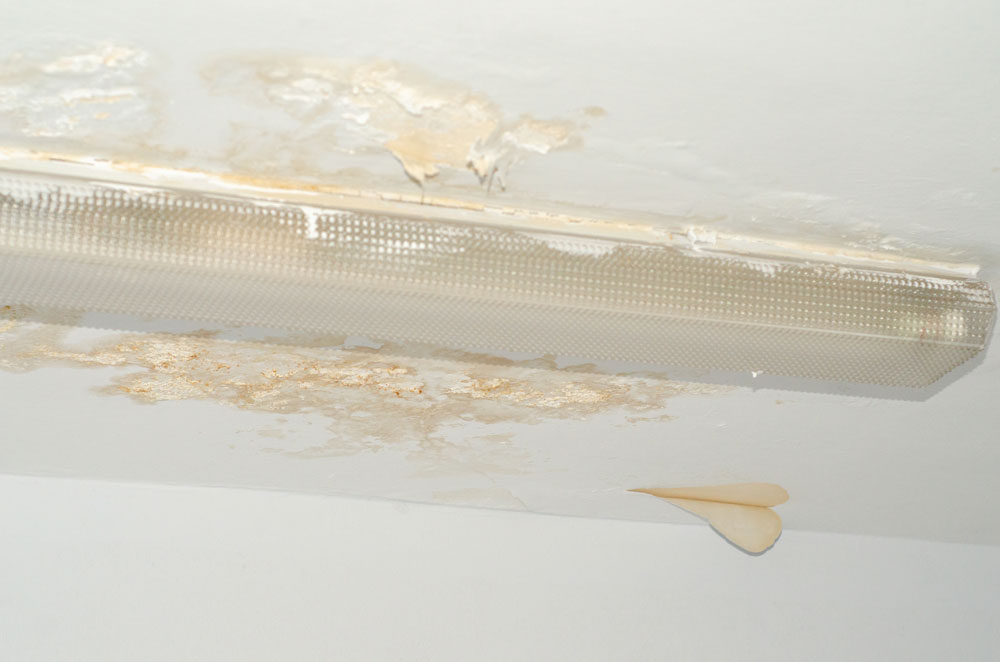Why Is There Mould On My Ceiling?
 CONTENTS
CONTENTS
- What causes mould on the ceiling?
- What are the signs of mould growth on the ceiling?
- The effects of mould on the ceiling
- How to remove mould growing on the ceiling
- Get in touch
Unsightly patches of green, black, and brown on your ceiling are not just ugly additions to your home, they are also the sign of a health hazard growing in your property. You must have mould dealt with immediately by professionals to keep yourself and others safe.
Here at ICE Cleaning, we offer our mould removal services nationwide. Our technicians have been accredited by Dewpoint Professional, the leading accreditor of mould remediation and mitigation, so they can remove mould from any facility.
Keep reading to find out what is causing mould to grow on your ceiling.
What causes mould on the ceiling?
Mould is a type of fungus that grows in environments that contain excess moisture. It is usually caused by high humidity, condensation, rising and penetrating damp, leaks, and flooding. Poor ventilation and air flow, and cold temperatures also contribute to its growth.
Ceilings are particularly susceptible to mould because warm air which carries lots of moisture rises and can cause condensation on a cool ceiling.
Certain rooms produce more steam and humidity due to the activities carried out in them, like cooking and washing. That is why the most common places to find mould is on the bathroom ceiling and in the kitchen. Insufficient insulation could also lead to mould on your ceiling as it makes the surface cooler.
A lack of maintenance can cause water damage in your ceiling, as well, which creates an environment conducive for mould growth. Even small roof leaks or plumbing problems can create enough wetness for mould to grow.
Different building materials may contribute, too. Plasterboard absorbs water easily while paint might provide a food source for some types of fungi, making them perfect breeding grounds for unwanted infestations.
What are the signs of mould growth on the ceiling?
One common indication is brown or black patches spreading across your ceiling. Mould also gives off a distinctive smell – an earthy and musty odour - which can permeate through rooms even before visible signs appear.
You may not think about touching your ceiling regularly, but it could be worth checking for unusual textures from time to time. Mould tends to feel slimy or fuzzy which differs significantly from smooth paintwork or wallpapered surfaces.
If you find yourself suffering from persistent allergies such as sneezing, coughing, or eye irritation while at home but relief when away, it could be down to mould releasing allergens into your home.
The effects of mould on the ceiling
Mould can cause significant damage to your home, especially when it grows on ceilings. This is because it weakens the structure by breaking down organic building materials, such as wood and drywall.
The health implications linked with indoor mould exposure are another major concern. These tiny airborne spores from your ceiling's mouldy patches may lead to respiratory problems including asthma attacks and allergic reactions. In more severe cases they could also contribute towards development of chronic conditions such as lung infections or bronchitis.
Some kinds of mould produce mycotoxins, too. These toxic substances can trigger more serious heath problems including fatal asthma attacks and sick building syndrome.
Certain groups are especially vulnerable to mould growth including people with pre-existing health conditions and weakened immune systems. Elderly or very young residents and visitors may also suffer from more serious reactions as a result of exposure.
How to remove mould growing on the ceiling
Addressing mould on your ceiling should always be left to mould remediation professionals. The cleaning hacks recommended online can bring in close contact with the harmful fungus and disturb it, resulting in spores being released into your property.
Rather than scrubbing at the affected surface with a harsh chemical, professionals have the specialist equipment and protective gear for a safe, thorough treatment without damaging your surfaces.
Cleaning mould off the ceiling is particularly difficult as it may be out of reach and hard to clean safely. Our technicians are IPAF-qualified and can safely work at height to remove every trace of the mould from your property.
Mould cleaners can also diagnose the specific cause of the mould in your home and provide recommendations on how to prevent it in the future. You can find out more about how to remove ceiling mould in this blog.
Get in touch
Our mould experts are available 24/7, 365 days a year, including bank holidays to deal with the mould problem in your home. We also offer a lifetime guarantee* so if the mould comes back our technicians will remove it for free.
Get in touch with our team on 0208 066 0360 or enquiries@icecleaning.co.uk to schedule your free site survey and get a no-obligation quote for our mould remediation services.
*subject to advisories

Speak with me today,
I’m here to help
By asking you a few questions either via phone or email I can immediately provide a realistic estimation of the cost.
You’re in good company. We’ve cleaned for the following commercial clients… View all

Why choose us?
- Cater to a wide variety of cleaning situations
- Nationwide coverage, available 24/7
- Cater to commercial and domestic clients
- Free survey provided prior to quotation
- Emergency response team
- Offer a bespoke service designed to suit all your needs
- All technicians hold professional health and safety qualifications, including BICSc, IOSH, Dewpoint Professional & Safe Contractor
We’re fully accredited
We place best practise, professional expertise and health and safety at the core of our business. We’re fully compliant with all legal obligations. You can view a list of our accreditations below, or visit our Health & Safety page for more information.











-RGB-small.1707319151.jpg)




















